How To Tell If You Need New Tires
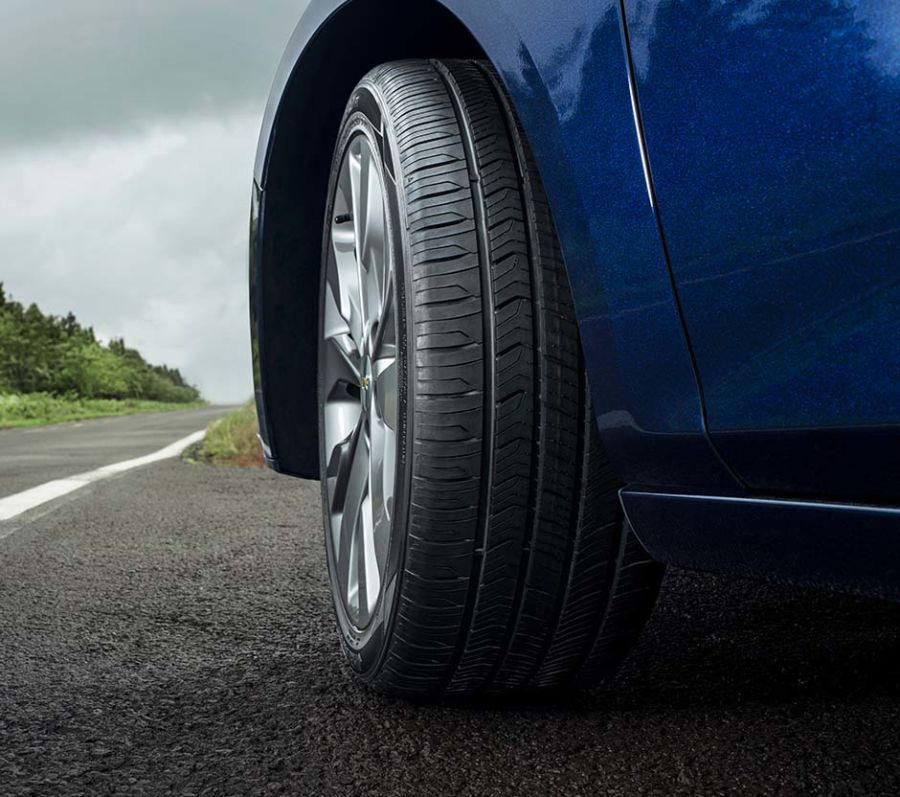
If you live in Vancouver, you know that we are faced with all different kinds of weather conditions. Not only do we face pretty adverse weather, it can happen all year round. From hail storms in the summer, to 25 degrees Celsius days in the winter; the drastic weather changes can make driving a complete nightmare. Let’s face it; when you’ve got summer heat during the day in the winter months, you often wake up to a sheet of ice by morning.
That’s why it’s so utterly important to make sure that your vehicle is well maintained. A major part of good vehicle maintenance, is tires. If the very things you’re driving on aren’t in good condition, you are literally an accident waiting to happen. Poor tire condition can result in loss of traction, reduced braking capabilities, can create wobbles, and can even lead to a collision from a blowout.
So, we’ve composed this list of tell-tale signs that you should switch out those old tires for new ones.
Signs & Symptoms That You Should Replace Your Tires
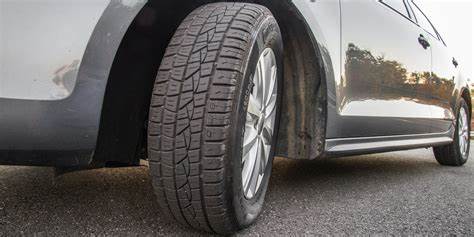
Sometimes it’s obvious that we need new tires. When you’re putting air in your tire on a weekly basis, you know that you’ve got a slow leak. Or when you’re driving along and it suddenly blows; that’s a given. There’s nothing like a tire exploding while driving on the freeway at over 100km/hr to tell you it’s time to replace it, right?
Other times, it can be hard to tell until it’s too late. Like when you suddenly hydroplane due to bald tires, and collide with the vehicle in front of you. Here are a few tips to help you identify if you should be switching your tires for some new ones.
1. Vibration
If you’re noticing that your vehicle has a newfound vibration while driving, and the mechanics can’t find the problem, it could be your tires. If your tires have uneven wear from not being balanced for a while, it can cause a shimmy. Or if you previously had issues with your brakes, and the wheels weren’t rotated after the repairs, that can also cause vibrations.
Also, if you’ve got slow leaks, and one or more of your tires have less air pressure, that can cause vibration too. That’s because your vehicle isn’t even driving on a level playing field from the start. Get your vehicle into a tire shop if you notice your car driving differently than usual.
2. Cracks, Gouges, Bulges, or Blisters
This one kind of goes without saying, but we’re going to say it anyways. If your tire has noticeable damage or blemishes on it, get it checked. Cracks can happen from things like extreme weather exposure. They can also happen from age or from hitting your tire on curbs repeatedly.
Gouges can come from curbs as well, and from taking your vehicle off-roading. Anything that causes direct contact with a foreign object, be it rocks or curbs, can cause damage to your tire.
If you’ve hit something recently, it’s best to get a tire expert like our friends at Kal Tire to give them a look. They know better than anybody how and when to fix a damaged tire.
Bulges and blisters can happen differently. They generally come from typical wear and tear. When your vehicle has a lot of drive time on it, it’s more likely to happen.
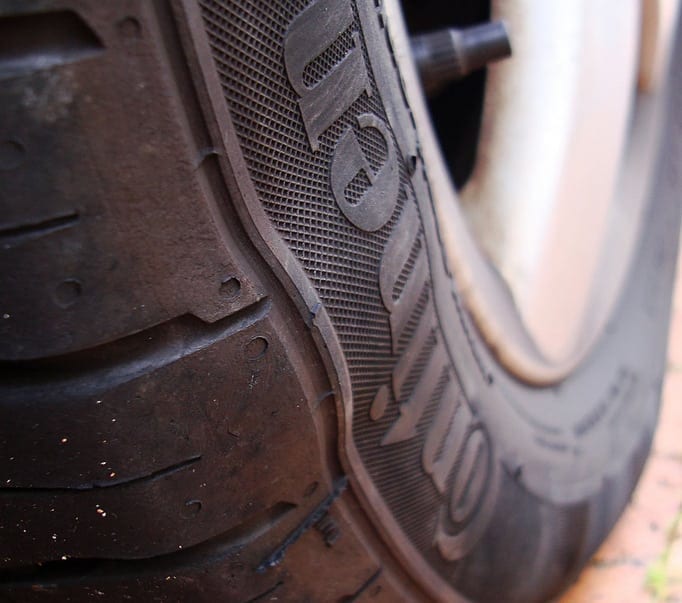
The tire itself is comprised of multiple layers of material. If one of those layers starts to separate, this can create a bulge or blister, which can cause a vibration while driving due to the deformity.
3. Tread Wear
As mentioned before, if you’ve got uneven tread wear on your tires, this can be a sign that you should replace them for some new ones. A good way to check if your tread is still reasonable, is to purchase a tire tread depth gauge.
Another tried and true way to check tire tread is with a penny (although those are hard to come by nowadays). Put your penny in between the treads of the tire. If you can still see the top of the head on the penny, your tread is good. If you can’t, it’s time for a tire change.
The best way in our opinion though is to spend the $5.00 at Canadian Tire and get yourself a tread depth gauge. It’s a once in a lifetime purchase, and for the price, you can’t go wrong.
4. Air Pressure in Your Tires
This was, again, something we touched on in the list previously. If you’re noticing that you have to fill your tires with air more than usual, that’s a clear indicator of a slow leak. If you’ve got a slow leak, you may not necessarily need to replace your tires. At the very least though, you should get it repaired.
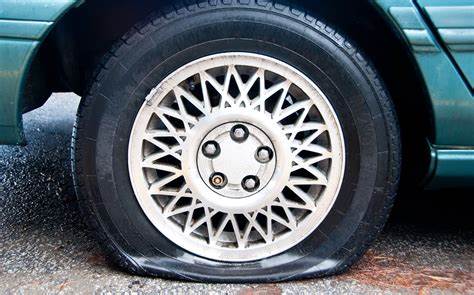
Driving on a tire that has a hole of any kind means that you’re driving on a compromised tire. And driving on something compromised, puts your vehicles performance at risk too. Starting, stopping, and maneuvering are all effected by bad tires, and so is your gas mileage. Don’t wait until you experience a blow out, or a tire that is damaged beyond repair.
Get your vehicle’s tires checked out immediately if you’re experiencing and kind of slow leak in your tires.
5. Temperature Changes
During the summer months, BC can get really, REALLY hot. With stifling temperatures of 44 degrees Celsius, our tires can take a real butt kicking. If your tires are under inflated during these months, they will wear out considerably faster due to the coupled extreme heat and wear. This can cause a much-needed tire replacement sooner than you might expect.
Winter can bring its own host of problems cause by the temperature change. If you’re driving on all-season tires, be prepared to bump up that air pressure as the cold weather hits. Cold causes tires to lose air pressure, and if you’re not watching for it, you could end up driving on improperly inflated tires. Which, again, can lead to poor grip on icy roads, and limited stopping power as a result.
How Do I Know if I Need New Winter Tires?
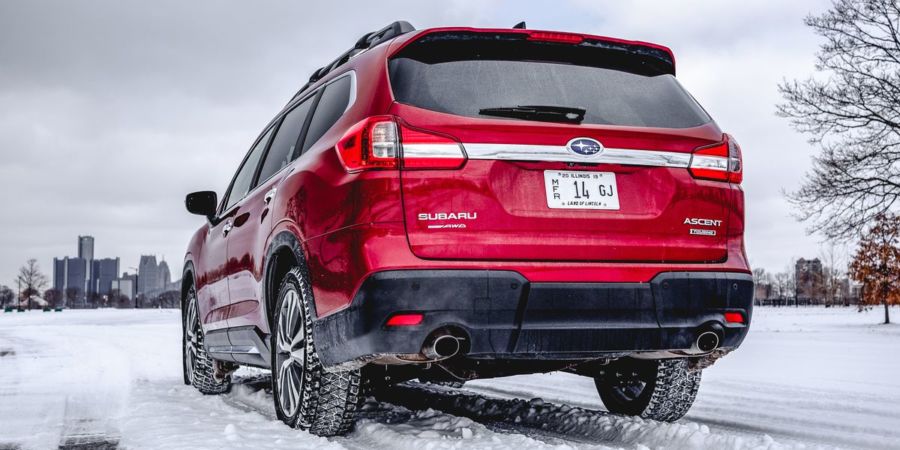
Winter tires are one of those things that are not necessarily required in the Greater Vancouver and Fraser Valley regions. Although, if you need winter tires for winter travel, you’ll want to make sure that your tires are in good shape before making any road trips. Even if you’re driving on all-season mud and snow tires, you need to make sure they are in tip-top shape before any long haul.
How do you do that? Well, for starters, check the wear indicators. Winter tires generally have indicator bars built in that let you know when the tread is less than optimal. There are usually 6 bars on a tire, and they are located along the inside of the tread grooves. Aside from that, use a tread depth gauge to get you the best reading on whether or not your tires are still good for another season.
Do I Really Need Winter Tires in Vancouver?
Winter tires aren’t always needed in British Columbia. However, if you regularly spend any of our winter months driving the Coquihalla, or head up to the Kootenays or anywhere North, you’ll want to make the investment into good winter tires.
Good winter tires, when interchanged with summer tires, can last a solid 5 or 6 seasons. But it is important to make sure that they are removed before the temperatures start to affect the integrity of the tire.
Winter tires are made primarily for temperatures above 7 degrees Celsius. When the temperatures start hitting consistently over this temp, it’s imperative that you change back to your summer tires. Nothing kills a quality winter tire like driving on it in warmer weather.
Tire Maintenance Best Practices
Whether you’re driving on winter tires, all-seasons, or summer tires, proper tire maintenance is key to preserving the longevity of your tires. And each type of tire requires a different kind of maintenance, but on the whole, all tires need general care.
Things Like:
- Making sure your tires are properly inflated all the time
- Making sure there isn’t any visible damage to the tire or the wheel it sits on
- Ensuring that you’re driving on the appropriate tire for the season and road conditions
- Having your tires rotated regularly
- Checking the tire tread to make sure your tires aren’t bald
Depending on the type of vehicle you drive, and what you use it for, your PSI will be relative to both these things. Check your owner’s manual to see what your tires she be inflated at, and when in doubt, check with a tire professional.
Vancouver’s Top Paying Used Car Buying Service
Cash For Cars BC is Vancouver’s #1 used vehicle buying service. We buy cars, trucks, SUV’s, and vans of every year, make, and model. Plus, we pay the MOST cash in the used car buying industry, which is why we buy more vehicles than any other used car buyer in Lower Mainland.
If you’ve been thinking about selling a vehicle, think Cash For Cars BC. Our used car buyers will answer any questions that you have, will walk you through the process, and provide you with an instant offer today. Call or text our team at (778) 838-5152.
